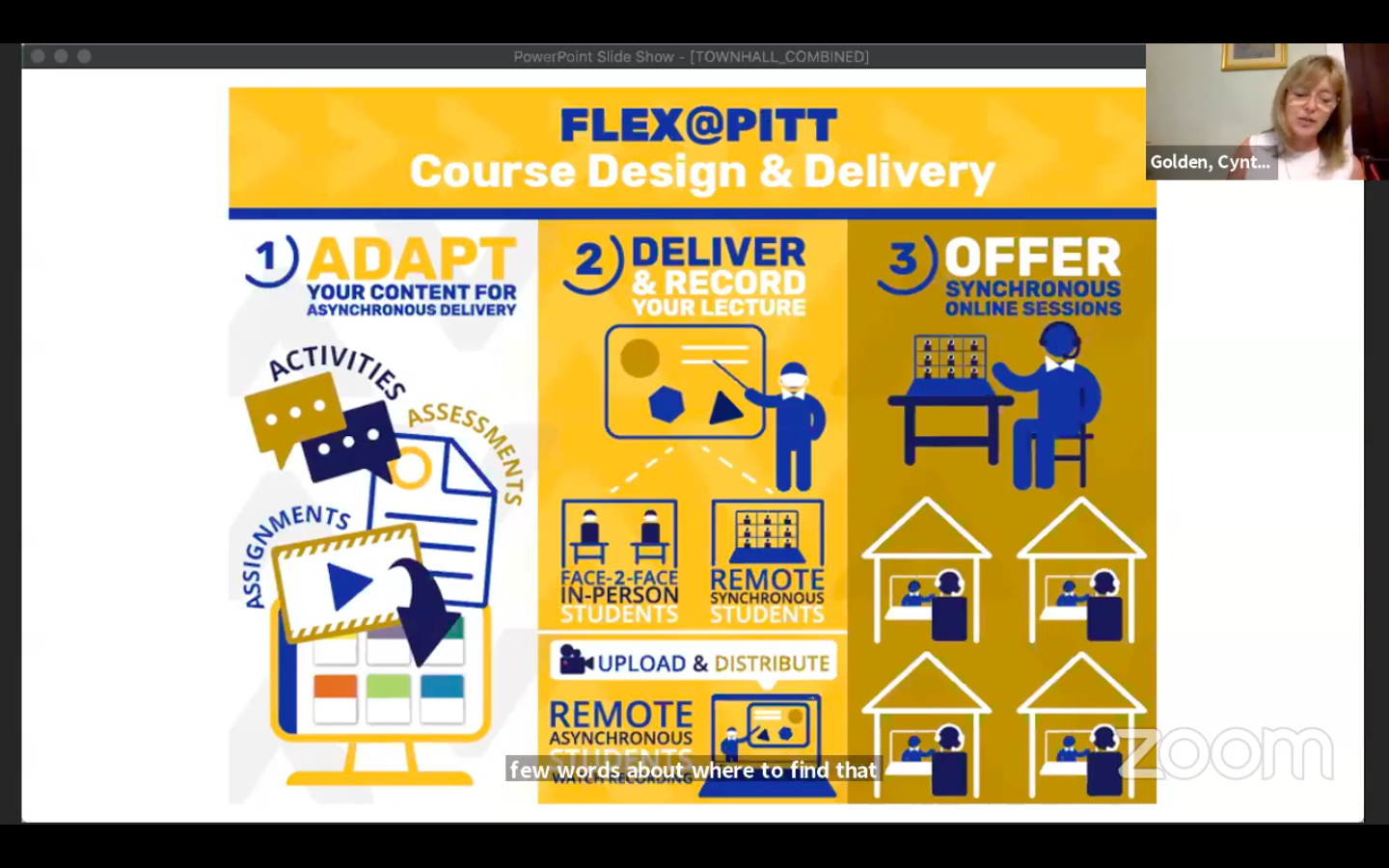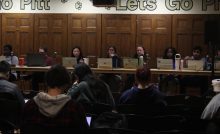Pitt officials discuss COVID testing, classroom capacities at faculty town hall


Assistant Vice Provost Cynthia Golden talks about the Flex@Pitt teaching model at Thursday's town hall.
Pitt will offer “systematic, random” COVID-19 testing to keep track of virus prevalence in the student population, University officials said Thursday.
John Williams, director of the University’s COVID-19 Medical Response Office, said Pitt’s student population will be separated into eight groups depending on where they are traveling from — Allegheny County, the rest of Pennsylvania, the rest of the country and international students. Each group is also separated by whether a student lives on or off campus.
Williams said students will be randomly selected for testing, and that data will be used to analyze community prevalence. Once a student is tested, Williams said, they will receive their results within two days.
“That will tell us in those first couple of weeks of arrival what is the prevalence of all the humans we just brought,” Williams said. “That will guide what we do going forward.”
Williams and other top administrators spoke at a Thursday afternoon faculty town hall regarding the new Flex@Pitt teaching model, fall classroom assignments and health protocols for students and faculty. The town hall was moderated by University Senate President Chris Bonneau.
The University announced the Flex@Pitt teaching model as a solution to growing concerns over the danger of in-person instruction. Using this teaching model, students have the choice of attending classes in person, synchronously via livestream or asynchronously via uploaded lectures and additional course materials.
According to Vice Chancellor and Chief Information Officer Mark Henderson, installation of new classroom technology to assist the Flex@Pitt model began Monday. He said faculty will be able to sign up for times to demo the new technology next week.
Provost Ann Cudd said 20% of classes still need to be assigned a physical classroom space and only 9% of undergraduate classes will end up being fully remote due to capacity restrictions. She said the University is also planning to provide nontraditional classroom spaces, such as an outdoor tent, for “certain classes where that would be useful because of the expelling of air.” She said she hopes all classroom assignments will be finalized by next week.
According to Cudd, only 16% of meeting rooms on campus qualify for safe in-person instruction, and facilities that will host in-person instruction are currently being evaluated to ensure proper air circulation.
“There’s a great deal of inspection of classrooms that’s going on. We’re inspecting the HVAC, we’re making sure that it’s working perfectly and tuned and looking at the air flow. We are marking off the exact number of spaces and making sure that’s all set,” she said.
Geovette Washington, senior vice chancellor and chief legal officer, said students are required to wear masks on campus when within 6 feet of other students, faculty and staff and when occupying shared spaces such as classrooms or other University facilities.
“If you can’t, we ask that you not come into the buildings,” Washington said.
Williams echoed Washington and said student behavior must be moderated to limit the spread.
“The key to virus control is mask, hand hygiene and distance,” Williams said. “Testing is not a magic bullet. It is an important tool, but it is really about behaviors.”
Recent Posts
SGB addresses concerns about ICE presence on campus, hears SJP lawsuit against administration, approves governing code bill
At its weekly meeting on Tuesday at Nordy’s Place, Student Government Board heard concerns about…
ACLU of Pennsylvania sues Pitt over SJP suspension
The ACLU of Pennsylvania filed a federal civil lawsuit against the University of Pittsburgh and…
Marquan Pope: The ultimate shark
One of the most remarkable things about sharks is that an injury doesn’t deter them.…
Who Asked? // Do we really get a summer vacation?
This installment of Who Asked? by staff writer Brynn Murawski mourns the seemingly impossible perfect…
Notes From an Average Girl // Notes from my junior year
In this edition of Notes From an Average Girl, senior staff writer Madeline Milchman reflects…
Meaning at the Movies // The Power of the Movie Theater
In this edition of “Meaning at the Movies,” staff writer Lauren Deaton discusses her love…

